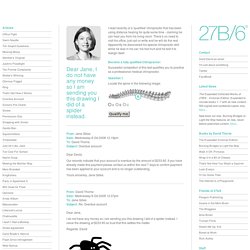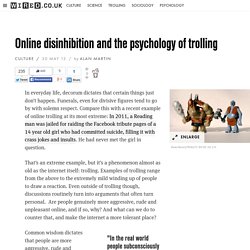

Psychology's answer to trolling and online abuse. Do we each harbour a dark passenger?

A malevolent psychopath? A fragile narcissist? Contrary to popular belief, decades of psychological research shows that anyone is capable of aggression, cruelty and violence. The "self" is a murky mixture of light and shade. Lately the dark side seems to be winning. While most of us agree there is a problem, much less has been said about possible solutions. Psychology may hold a big piece of the puzzle. Suler's basic idea was that by masking their identities, abusers not only avoid accountability for their behaviour but also dissociate their online selves from their real-world selves. Many aspects of Suler's theory remain untested, but a recent Israeli study found that people were less likely to issue online threats under their true identity, suggesting that anonymity is one contributing factor.
So what can be done to reshape the cognition of an abuser? Cognitive Behavioural Therapy Cognitive Bias Modification Inhibition Training Empathy Training. Yik Yak is the hottest messaging app. So how are Brits using it? Are you yakking yet?

No, not a reference to throwing up as part of a venomous post-Christmas-party hangover. Yik Yak is the latest messaging app to take US college campuses by storm, and then Silicon Valley. The app, which makes anonymity a key feature, launched in November 2013, had 100,000 users by February 2014, and then raised a startling $61m funding round in November.
This, for what its founders describe as “the only way to create a localised social forum without prior relationships or friendships for the purpose of delivering relevant, timely content to hyper-local areas of people”. Or, once it gets into the hands of Brits, one of the many ways to boast about how you’re throwing up as part of a venomous hangover. At least, that’s what using Yik Yak’s “Peek” feature to see what people are yakking about in specific locations threw up when I looked at 10 of the largest cities in the UK, curious to see what Brits were making of the $61m messaging app. And? London Birmingham Leeds Glasgow. Yik Yak - Ride the Yak. Richard Dawkins Reads Hate Mail From “Fans” Psychology's answer to trolling and online abuse. TROLLING Online commenting: the age of rage.
For a while after his first TV series was broadcast in 2009, comedian Stewart Lee was in the habit of collecting and filing some of the comments that people made about him on web pages and social media sites.

He did a 10-minute Google trawl most days for about six months and the resultant collected observations soon ran to dozens of pages. If you read those comments now as a cumulative narrative, you begin to fear for Stewart Lee. A good third of the posts fantasised about violence being done to the comic, most of the rest could barely contain the extent of their loathing. This is a small, representative selection: "I hate Stewart Lee with a passion. Lee, a standup comedian who does not shy away from the more grotesque aspects of human behaviour, or always resist dishing out some bile of his own, does not think of himself as naive.
The "40,000 words of hate" have now become "anthropologically amusing" to him, he insists. The psychologists call it "deindividuation". Next time, I'll spend the money on drugs instead. From: Jane GillesDate: Wednesday 8 Oct 2008 12.19pmTo: David ThorneSubject: Overdue account Dear David, Our records indicate that your account is overdue by the amount of $233.95.

If you have already made this payment please contact us within the next 7 days to confirm payment has been applied to your account and is no longer outstanding. Yours sincerely, Jane GillesFrom: David ThorneDate: Wednesday 8 Oct 2008 12.37pmTo: Jane GillesSubject: Re: Overdue account Dear Jane, I do not have any money so I am sending you this drawing I did of a spider instead. From: Jane GillesDate: Thursday 9 Oct 2008 10.07amTo: David ThorneSubject: Overdue account Dear David, Thank you for contacting us. Dear Jane,
Online disinhibition and the psychology of trolling. In everyday life, decorum dictates that certain things just don't happen.

Funerals, even for divisive figures tend to go by with solemn respect. Compare this with a recent example of online trolling at its most extreme: In 2011, a Reading man was jailed for raiding the Facebook tribute pages of a 14 year old girl who had committed suicide, filling it with crass jokes and insults. He had never met the girl in question. That's an extreme example, but it's a phenomenon almost as old as the internet itself: trolling. Examples of trolling range from the above to the extremely mild winding up of people to draw a reaction. Common wisdom dictates that people are more aggressive, rude and forthright online because they're anonymous and can act as unpleasantly as they like without immediate consequence.
Psychologist John Suller wrote a paper on this in 2004, entitled "The Online Disinhibition Effect", where he explored six factors that could combine to change people's behaviour online. Internet Trolling.